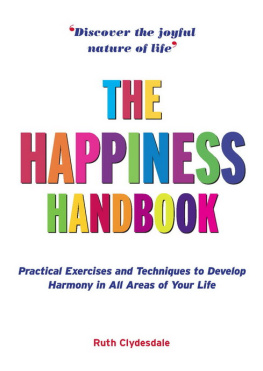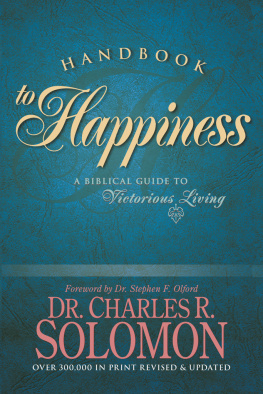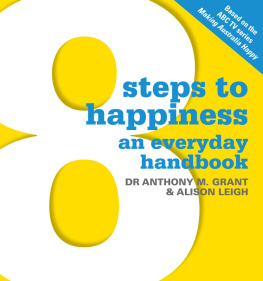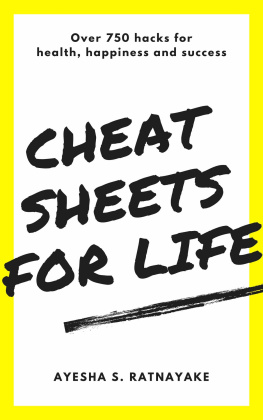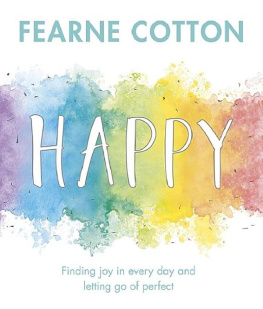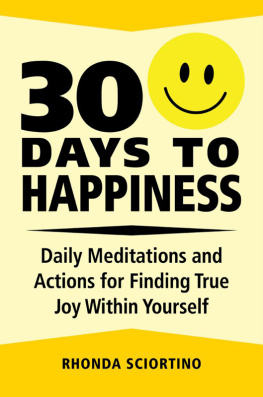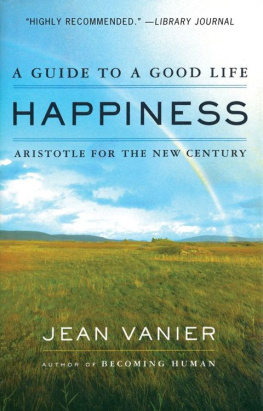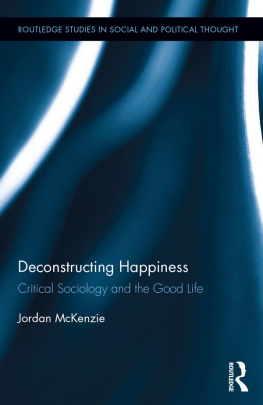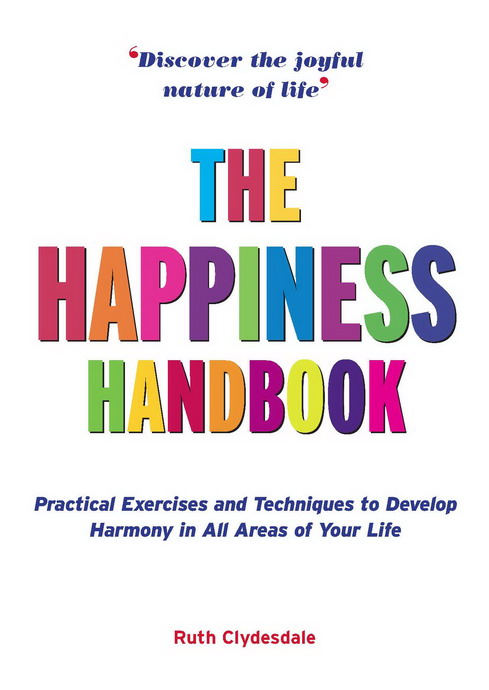

This edition published in 2011 by Arcturus Publishing Limited
26/27 Bickels Yard, 151153 Bermondsey Street,
London SE1 3HA
Copyright 2011 Arcturus Publishing Limited/Ruth Clydesdale
All rights reserved. No part of this publication may be reproduced, stored in a retrieval system, or transmitted, in any form or by any means, electronic, mechanical, photocopying, recording or otherwise, without prior written permission in accordance with the provisions of the Copyright Act 1956 (as amended). Any person or persons who do any unauthorised act in relation to this publication may be liable to criminal prosecution and civil claims for damages.
ISBN: 978-1-84858-509-6
AD001103EN
Contents
There are moments in life when everything changes. Reading a simple phrase did it for me: 'Be happy now!' What surprised me was that although the trenchant advice sounded so contemporary, the writer was a magician and philosopher who lived in the 15th century. But how on earth could I go about following such a recommendation? That's what I wanted to discover, so I set out on a quest and I found a method of wisdom teaching that had been lost for centuries. Using this knowledge transformed my life. I hope that by reading on, you too will learn to be happy, now and always.
Who was the magician who knew the secret of happiness? His name was Marsilio Ficino (143399), and he lived in Florence during the most exciting years of the Renaissance. A small, kindly and unassuming man, he was one of the most remarkable people in Western history. His range of knowledge was extraordinary: he was a priest, philosopher, doctor, astrologer, musician and magus. Hardly surprising, then, that he was one of the most influential figures of the Italian Renaissance. Not only was he respected right across Europe for his recovery of ancient Greek wisdom teaching and his inspired realization that it can be reconciled with Christianity, but he was also deeply loved by a wide circle of devoted friends.
Ficino dispensed wisdom tempered by wit and, despite his great learning and influence, remained modest and accessible to all. He was a doctor to his friends, composed healing music for them, and performed magical rituals and exorcisms. His profound knowledge of Greek philosophy was unrivalled, and from it he drew the practical advice that he dispensed when asked. But Ficino was anything but a dry academic. He learnt his wisdom in the most direct way of all: by applying it to his own experience of life.
The magic of Ficino is that he recognized that life isn't perfect not even for the rich, the beautiful or the powerful. That doesn't mean that he gave up the search for happiness: far from it. Ficino worked all the harder to find a stable and reliable source of joy and fulfilment. What's more, he succeeded, and along the way he discovered methods of improving all areas of life relationships, health and work among them. Ficino's advice sometimes draws on common sense and sometimes on magic and astrology. Much of it displays an understanding of how we tick: of psychology.
Ficino's advice is particularly interesting to us in the 21st century because it is holistic. He tells us how to stay physically healthy and how to nourish ourselves emotionally. He also gives advice on finding the most satisfying way to earn a living, and on drawing love into our lives and, for those who want it, he offers wisdom relating to the soul and our spiritual existence.
All this advice hangs together because it is founded on a single principle: that of harmony. Ficino lived at a time when the universe was seen as sacred, a divine creation. The harmonic force of love holds everything together; the cosmos is like a great piece of music, the planets singing as they move; and every person is a tiny universe, a microcosm of the macrocosm. Medicine in Ficino's day aimed at harmonizing the forces of the body, and Ficino's therapies do the same for the emotions and the soul. His purpose is to bring us into harmony with the cosmos, so that our lives run smoothly and beautifully, without jarring discord.
However, we're living in the material world, far from the spiritual perfection of heaven, so some discord is to be expected. Ficino's advice helps us to deal with this by keeping it in proportion. This is what philosophy meant to him, which is something very different from what it is today. Philosophy in fact means 'love of wisdom', and for Ficino and his friends it signified finding a way to live that worked on all levels. It's a path that encompasses both practical issues and spiritual questions, and that is what we look at in this book.
Ficino was drawing on ancient, mystical knowledge, and his wisdom is timeless. These days we might not be in a position to follow some of his more arcane advice, such as making pills of crushed jewels rolled in gold leaf, but a large number of Ficino's recommendations for living well and happily are very relevant to us. Taken together, they add up to a complete set of instructions for life, from caring for the body to developing a rich spiritual existence.
We do, however, have to understand some Renaissance ideas about our bodies, souls and the cosmos in order to make the most of this ancient wisdom. These will be explained as we go along, and they can be taken symbolically rather than as representing objective reality. We will learn to look at the world through symbols, and the advantage of this (apart from its being fun!) is that even the most boring, mundane thing or action is imbued with significance. We will see the universe as alive every single part of it and ourselves as being essential parts of an awesomely vast whole.
Ficino never systematized his wisdom, but that's what I've done in this book, which brings together all the insights he set out in letters to friends, books on health and magical manuals. Once I'd gathered this material together, I realized that it fell naturally into a graduated system. We begin by looking at our physical and emotional needs, then progress through increasingly refined levels of existence until we finish with the soul. Thus the early chapters contain advice that's largely common sense, although expressed in more colourful terms than you may be used to. Then we move into more mysterious realms of magic and astrology before leaving those too behind and entering into the world of spirit and soul. By the time you reach that stage, you will effectively have been initiated into a timeless wisdom teaching.
Each chapter contains exercises for you to do and advice that you can apply to your life, but our exploration of Ficino's wisdom builds up into a system that you'll only see properly if you read the whole book. We approach the secret of true happiness slowly and in stages and once we get there, it illuminates everything. However, your journey is an individual one. So, while every chapter is important for every area of life needs some attention it's left up to you, the reader, to decide where your most pressing individual needs lie. We're all different, and everyone will focus on some particular part or parts of this ancient advice. The wonderful thing you'll discover is that Ficino's advice works. Try it and you will see. The result is happiness right here, right now!
Let's begin at the beginning, with some practical tips on making life comfortable for ourselves. Once you've learned how to create and maintain a firm foundation of physical contentment, then you will be in a good position to start looking at how to increase your happiness in other ways.
Next page
